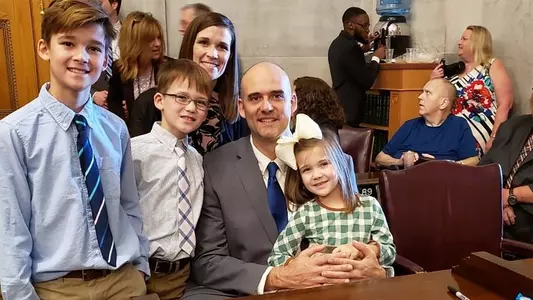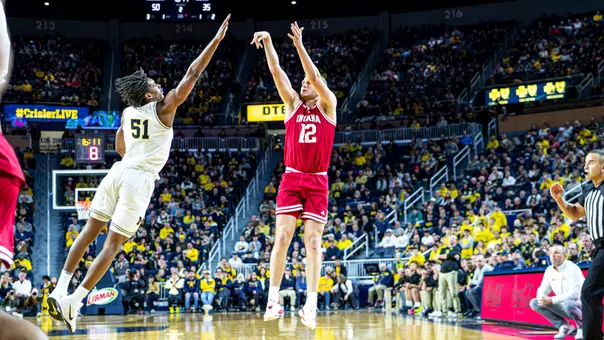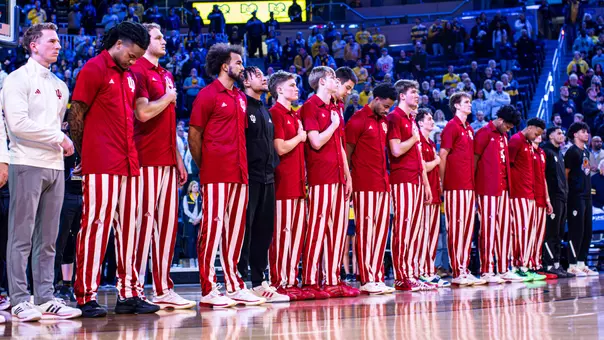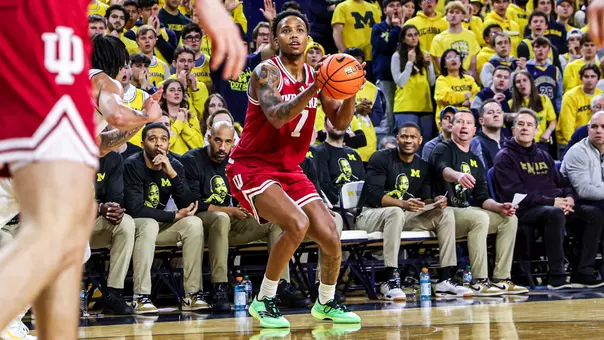Indiana University Athletics

From Our House to the Statehouse
5/11/2020 10:57:00 AM | Men's Basketball, History
Four years ago, Kirk Haston found himself sitting down, legal pad in hand.
In front of him was State of Tennessee General Assembly's website, complete with the biographies of the representatives from the state's 99 districts. As he scrolled through the names and noted their backgrounds, he noticed a diversity of professions and valuable experiences that the current members brought.
He jotted down that a handful of the current members were ministers, a couple of others were truck drivers. There were jewelry store owners, insurance agents and bankers. But by the time he'd viewed the last of the 99 representatives, he thought there was one profession that wasn't surfacing from his research, one that could and should offer a voice in the goings-on in Nashville.
"I noticed there weren't any active teachers or public educators that were part of the legislature," Haston said. "I thought that would be a good voice to have."
As a third-generation public school teacher and also the head boys basketball coach at the same Perry County H.S. that he had starred at as a prep two decades earlier, the former Indiana University men's basketball star was willing to offer that voice.
While Haston was willing, he wasn't entirely sure he'd be able. While Rep. Steve McDaniel was stepping down as the district's representative after 30 years, Haston was one of three Republicans vying for the party's spot on the 2018 ballot. Haston was pitted against two individuals with more money to spend, and one of his foes had McDaniel's endorsement as well.
Adding to Haston's uphill battle was the fact that the district includes four counties, with Haston's Perry County home including only 8-10 percent of the district's population. It had been more than 60 years since a Perry County resident had represented the district in the statehouse – Haston's great-grandfather, Pleas Doyle.
The early indicators suggested Haston's chances were remote.
"When the first polls came out in February, I think I was down by 30-40 percent," Haston said.
But Haston was undeterred by the long odds and his limited campaign coffers. He employed an old-school/new-school strategy, relying on both social media and door-to-door encounters to introduce himself and his ideas to his western Tennessee district's residents.
Haston said he knocked on 1,000 doors during that 2018 campaign, no small feat considering the rural makeup of the district and the fact Haston admits to being more of an introvert than an extrovert. His encounters were overwhelmingly positive, customarily constructive…and, on a rare occasion, uncomfortable and even painful.
"I got bit on the hand by one dog, and I had one gentleman, I wouldn't say he fully cussed me out, but he was really disturbed by me being at his house," Haston said. "I had another gentleman who, when I put my hand out to shake it, just stared at it.
"But for the most part it was extremely positive. People had legitimate questions and appreciated me taking the time to talk to them about their concerns."
Haston's efforts paid off. First, he emerged victorious in the 2018 Republican primary, edging Henderson County Mayor Dan Hughes by less than 200 votes. When the November general election rolled around there was no similar drama, as Haston won the heavily Republican district with 81 percent of the vote.
He's now nearly a year and half into his first term in the state legislature, and gearing up for a run at a second term this fall.
While Haston's background in education was the primary motivator behind his venture into politics, it's hardly the only area that he's been making an impact. In addition to being the Vice Chair of the Education Committee and a member of the House's K-12 Subcommittee, he's also a member of the Commerce Committee and the Banking and Investments Subcommittee. He's sponsored legislation in those areas and others, and he relishes the opportunity to positively impact the lives of his constituents.
When Tennessee's General Assembly is in session from January thru early May, Haston said he's at the state capitol in Nashville for about 2 ½ days per week. During those times his days can be hectic; he said that within a 30-minute time frame he could have as many as six meetings on topics as wide-ranging as dealing with the COVID-19 pandemic through tele-healthcare medicine to a bill that relaxed the training requirements for hair braiders.
That diversity of topics, and the impact that Haston and the rest of the General Assembly can have on the lives of Tennesseans through their decisions, has made him a quick and dedicated study on a whole lot of topics.
"We had a high school group come in and one of the students asked, 'What is the No. 1 qualification for someone who would want to do something like this?'" Haston said. "I said that you better enjoy the process of learning. You better enjoy school. I've done more studying and reading – this is no knock on my Indiana University education, because it was great – but I think I've done more learning and studying in my last two years than I did in my entire time in college.
"You have to be a pseudo-expert on a lot of things quickly. Or, if you're not an expert, you have to be honest enough to say I don't know about that, and you better get to work finding out about it."
It's been a rewarding experience for Haston, who says he enjoys the opportunity to meet with and hear the ideas from groups, organizations and lobbyists when he's in Nashville. But what he enjoys more is the chance to hear directly from his constituents back home and help address their issues and give voice to their ideas in the legislature.
That happened recently when Haston found himself talking with a friend from his church. Soon after hearing his concern, Haston was back in Nashville meeting with attorneys on the capitol to draft a bill that addressed the issues voiced by his friend.
"I brought (the bill) to him at church and handed it to him, and said to be careful what you talk to me about in church," Haston said.
A similar incident happened in an elementary school teacher's lounge. Haston was visiting the elementary school in Scotts Hills, Tennessee, a town of less than 1,000 about an hour from his hometown of Lobelville. There, he had a heart-to-heart conversation with Lauren Bobo, a member of the elementary school staff.
In 2011, Bobo's 20-year-old daughter, Holly, was kidnapped and murdered in Henderson County. At the time, the Tennessee Bureau of Investigations only issued endangered child alerts for individuals under the age of 18, which many believe hindered the initial response to Holly's disappearance.
"I talked with Lauren, and she was asking if there was anything we could do about that," Haston said.
So Haston looked into the issue. He said he discovered that 70 percent of the missing persons in the U.S. are under the age of 21.
"The age of 20 is kind of the age of demarcation," Haston said. "So 18, 19, 20, was a danger area that could be helped by some of these alerts."
So based on that conversation and his subsequent research, Haston introduced the Holly Bobo Act, which was subsequently passed unanimously in the Tennessee House and Senate this March. It changes the age guidelines from under 18 to under 21 for the TBI's endangered person alerts.
"That all came from a discussion in the Scotts Hill teacher's lounge," Haston said.
While Haston is only 16 months into his political career, he's beginning to gear up for a re-election campaign this fall. As is common for most first-term state representatives, he does have one primary challenger in the August primary, followed by a November general election opponent.
Haston knows that the COVID-19 pandemic will alter his campaigning plans this spring, summer and fall, preventing the normal assortment of Friday Fish Frys and community events. While his successes during his first term make it likely that he'll be re-elected, he knows there are no guarantees.
But with that said, no matter what happens, his experiences with items like the Holly Bobo Act have made it all worthwhile.
"That's the kind of stuff that if I don't get re-elected this year, I can look back at (the Holly Bobo Act) and it's something that is going to be there for decades to come," Haston said. "And if it helps just one family out in the next 10-20 years, from that discussion in the teacher's lounge, then that work and this experience was well worth it."
In front of him was State of Tennessee General Assembly's website, complete with the biographies of the representatives from the state's 99 districts. As he scrolled through the names and noted their backgrounds, he noticed a diversity of professions and valuable experiences that the current members brought.
He jotted down that a handful of the current members were ministers, a couple of others were truck drivers. There were jewelry store owners, insurance agents and bankers. But by the time he'd viewed the last of the 99 representatives, he thought there was one profession that wasn't surfacing from his research, one that could and should offer a voice in the goings-on in Nashville.
"I noticed there weren't any active teachers or public educators that were part of the legislature," Haston said. "I thought that would be a good voice to have."
As a third-generation public school teacher and also the head boys basketball coach at the same Perry County H.S. that he had starred at as a prep two decades earlier, the former Indiana University men's basketball star was willing to offer that voice.
While Haston was willing, he wasn't entirely sure he'd be able. While Rep. Steve McDaniel was stepping down as the district's representative after 30 years, Haston was one of three Republicans vying for the party's spot on the 2018 ballot. Haston was pitted against two individuals with more money to spend, and one of his foes had McDaniel's endorsement as well.
Adding to Haston's uphill battle was the fact that the district includes four counties, with Haston's Perry County home including only 8-10 percent of the district's population. It had been more than 60 years since a Perry County resident had represented the district in the statehouse – Haston's great-grandfather, Pleas Doyle.
The early indicators suggested Haston's chances were remote.
"When the first polls came out in February, I think I was down by 30-40 percent," Haston said.
But Haston was undeterred by the long odds and his limited campaign coffers. He employed an old-school/new-school strategy, relying on both social media and door-to-door encounters to introduce himself and his ideas to his western Tennessee district's residents.
Haston said he knocked on 1,000 doors during that 2018 campaign, no small feat considering the rural makeup of the district and the fact Haston admits to being more of an introvert than an extrovert. His encounters were overwhelmingly positive, customarily constructive…and, on a rare occasion, uncomfortable and even painful.
"I got bit on the hand by one dog, and I had one gentleman, I wouldn't say he fully cussed me out, but he was really disturbed by me being at his house," Haston said. "I had another gentleman who, when I put my hand out to shake it, just stared at it.
"But for the most part it was extremely positive. People had legitimate questions and appreciated me taking the time to talk to them about their concerns."
Haston's efforts paid off. First, he emerged victorious in the 2018 Republican primary, edging Henderson County Mayor Dan Hughes by less than 200 votes. When the November general election rolled around there was no similar drama, as Haston won the heavily Republican district with 81 percent of the vote.
He's now nearly a year and half into his first term in the state legislature, and gearing up for a run at a second term this fall.
While Haston's background in education was the primary motivator behind his venture into politics, it's hardly the only area that he's been making an impact. In addition to being the Vice Chair of the Education Committee and a member of the House's K-12 Subcommittee, he's also a member of the Commerce Committee and the Banking and Investments Subcommittee. He's sponsored legislation in those areas and others, and he relishes the opportunity to positively impact the lives of his constituents.
When Tennessee's General Assembly is in session from January thru early May, Haston said he's at the state capitol in Nashville for about 2 ½ days per week. During those times his days can be hectic; he said that within a 30-minute time frame he could have as many as six meetings on topics as wide-ranging as dealing with the COVID-19 pandemic through tele-healthcare medicine to a bill that relaxed the training requirements for hair braiders.
That diversity of topics, and the impact that Haston and the rest of the General Assembly can have on the lives of Tennesseans through their decisions, has made him a quick and dedicated study on a whole lot of topics.
"We had a high school group come in and one of the students asked, 'What is the No. 1 qualification for someone who would want to do something like this?'" Haston said. "I said that you better enjoy the process of learning. You better enjoy school. I've done more studying and reading – this is no knock on my Indiana University education, because it was great – but I think I've done more learning and studying in my last two years than I did in my entire time in college.
"You have to be a pseudo-expert on a lot of things quickly. Or, if you're not an expert, you have to be honest enough to say I don't know about that, and you better get to work finding out about it."
It's been a rewarding experience for Haston, who says he enjoys the opportunity to meet with and hear the ideas from groups, organizations and lobbyists when he's in Nashville. But what he enjoys more is the chance to hear directly from his constituents back home and help address their issues and give voice to their ideas in the legislature.
That happened recently when Haston found himself talking with a friend from his church. Soon after hearing his concern, Haston was back in Nashville meeting with attorneys on the capitol to draft a bill that addressed the issues voiced by his friend.
"I brought (the bill) to him at church and handed it to him, and said to be careful what you talk to me about in church," Haston said.
A similar incident happened in an elementary school teacher's lounge. Haston was visiting the elementary school in Scotts Hills, Tennessee, a town of less than 1,000 about an hour from his hometown of Lobelville. There, he had a heart-to-heart conversation with Lauren Bobo, a member of the elementary school staff.
In 2011, Bobo's 20-year-old daughter, Holly, was kidnapped and murdered in Henderson County. At the time, the Tennessee Bureau of Investigations only issued endangered child alerts for individuals under the age of 18, which many believe hindered the initial response to Holly's disappearance.
"I talked with Lauren, and she was asking if there was anything we could do about that," Haston said.
So Haston looked into the issue. He said he discovered that 70 percent of the missing persons in the U.S. are under the age of 21.
"The age of 20 is kind of the age of demarcation," Haston said. "So 18, 19, 20, was a danger area that could be helped by some of these alerts."
So based on that conversation and his subsequent research, Haston introduced the Holly Bobo Act, which was subsequently passed unanimously in the Tennessee House and Senate this March. It changes the age guidelines from under 18 to under 21 for the TBI's endangered person alerts.
"That all came from a discussion in the Scotts Hill teacher's lounge," Haston said.
While Haston is only 16 months into his political career, he's beginning to gear up for a re-election campaign this fall. As is common for most first-term state representatives, he does have one primary challenger in the August primary, followed by a November general election opponent.
Haston knows that the COVID-19 pandemic will alter his campaigning plans this spring, summer and fall, preventing the normal assortment of Friday Fish Frys and community events. While his successes during his first term make it likely that he'll be re-elected, he knows there are no guarantees.
But with that said, no matter what happens, his experiences with items like the Holly Bobo Act have made it all worthwhile.
"That's the kind of stuff that if I don't get re-elected this year, I can look back at (the Holly Bobo Act) and it's something that is going to be there for decades to come," Haston said. "And if it helps just one family out in the next 10-20 years, from that discussion in the teacher's lounge, then that work and this experience was well worth it."
IUBB v RUT Highlights
Friday, January 23
IUBB v MICH Highlights
Tuesday, January 20
FB: Curt Cignetti Media Availability (1/17/26)
Sunday, January 18
IUBB Postgame Press Conference
Saturday, January 17




